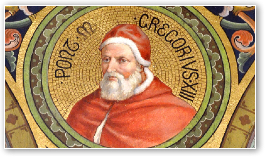Happy New Year!
- FATHER RAYMOND J. DE SOUZA
The ordering of time in the world reflects what a culture thinks about celestial realities, whether it be the movement of the heavenly orbs or heaven itself.
 Happy New Year! Yes, it's March, but had we been in England — or the English colonies — from 1155 to 1752, we would have been getting ready for new year's eve this Thursday, as March 25 would have been New Year's Day.
Happy New Year! Yes, it's March, but had we been in England — or the English colonies — from 1155 to 1752, we would have been getting ready for new year's eve this Thursday, as March 25 would have been New Year's Day.
Having March 25 as the start of the new year is still reflected in the fiscal year used for personal taxes in the United Kingdom, which begins on April 6: that's March 25 plus the 11 missing days that were lost when Britain shifted from the Julian calendar to the Gregorian in 1752. (His Majesty's Exchequer, then as now, was not prepared to lose 11 days of tax revenue.) In Canada, our federal government's fiscal year begins on April 1, reflecting a similar history.
In principle, any day of the year could be new year's day. The original Roman calendar only had 10 months, and began with March. Ever wonder why the months named after the Latin numbers — September (seven), October (eight), November (nine) and December (10) — don't correspond to their current order in the calendar? It's because January and February only came after, expanding the 10-month calendar to 12.
But that doesn't explain the reason for the new year beginning on March 25. That's explained by what the early Christians believed about Good Friday. For Christians who follow the Western (Gregorian) calendar, this is Holy Week, when they commemorate the suffering, death and resurrection of Jesus Christ.
The ordering of time in the world reflects what a culture thinks about celestial realities, whether it be the movement of the heavenly orbs or heaven itself. How we mark time reflects what we think about eternity.
"Jewish tradition gave the date of March 25th to Abraham's sacrifice," wrote then cardinal Joseph Ratzinger, explaining the significance of the date for Christians. "This day was also regarded as the day of creation, the day when God's word decreed: 'Let there be light.' It was also considered, very early on, as the day of Christ's death and eventually as the day of his conception. The mysterious words in Revelation 13:8 about the 'Lamb slain from the beginning of the world' could also perhaps be interpreted in the same way.… These cosmic images enabled Christians to see, in an unprecedented way, the world-embracing meaning of Christ and so to understand the grandeur of the hope inscribed in Christian faith."
More recent scholarship reveals it was the opposite.
The idea of March 25 as the date around which history turns is not intended to be a matter of chronological exactitude. It is not a matter of chronos — the simple counting of moments — but of kairos — the understanding of time as the stage on which the drama of God's engagement with man unfolds. That's the meaning of Holy Week.
Thus the idea of a single date that embraces the mystery of creation, of incarnation and redemption, reflects that God does not remain distant, but enters into the realm of change and contingency to accompany His creation.
All this is highlighted when Good Friday falls on March 25. Christian preachers will be explaining this Holy Week what it means to think about time in its fullest, most cosmic sense, as an encounter with the infinity and the intimacy of God.
It does not happen often. Because Easter is set according to the lunar cycle, on the Western (Gregorian) calendar, Good Friday fell on March 25 in 1921 and 1932, then again in 2005 and this year, 2016. It won't happen again for more than a century. March 25 is related, not only to Easter, but also to Christmas. For much of history, it was thought that Christmas was set on Dec. 25 to displace a pagan festival in honour of Mithras. More recent scholarship reveals it was the opposite. It was March 25 that was set as the great day of God's initiative, and thus for what is known as the Annunciation — the visit of Archangel Gabriel to Mary in Nazareth and the virginal conception of Jesus. Christmas was then set nine months later.
Surprisingly, it was the calendar reform of Pope Gregory XIII in 1582 that changed the Christian practice of beginning the new year on March 25 to Jan. 1, which was celebrated by the pagan Romans. The saeculum — roughly translated to mean "time" or "the ages," from which we get the French word siècle — became more secular.
This week, this Holy Week, this Good Friday, that sense of kairos returns in a fuller sense. The dates come and go, but the deepest meaning of March 25 is that all of them are in the Providence of a loving God. To all my readers: a blessed Holy Week and Happy Easter.
 This is Meaghen Gonzalez, Editor of CERC. I hope you appreciated this piece. We curate these articles especially for believers like you.
This is Meaghen Gonzalez, Editor of CERC. I hope you appreciated this piece. We curate these articles especially for believers like you.
Please show your appreciation by making a $3 donation. CERC is entirely reader supported.

Acknowledgement
 Father Raymond J. de Souza, "Happy New Year!" National Post, (Canada) March 22, 2016.
Father Raymond J. de Souza, "Happy New Year!" National Post, (Canada) March 22, 2016.
Reprinted with permission of the National Post and Fr. de Souza.
The Author
Father Raymond J. de Souza is the founding editor of Convivium magazine.
Copyright © 2016 National Post



